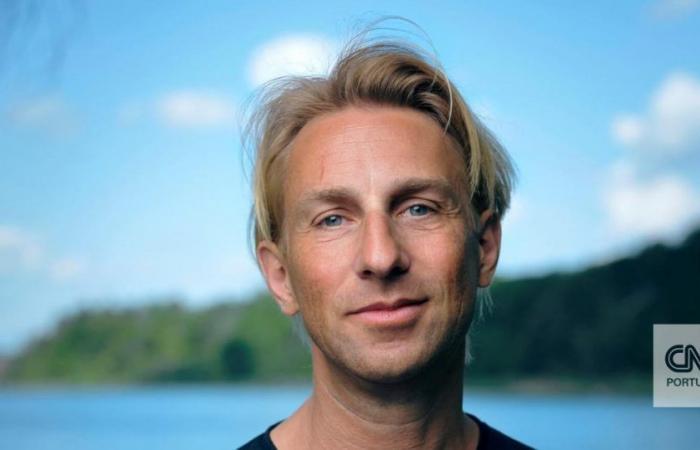
INTERVIEW | After all, what is happiness? How do we feel permanently dissatisfied if humanity has never had such a comfortable life with easy access to so many things? How important is biology in happiness? These and other questions were answered in a conversation with Swedish psychiatrist Anders Hansen, author of the book “Why do we feel bad when everything is going well?”
Renowned psychiatrist, Swedish Anders Hansen has published several books, with millions of copies sold, and awarded awards. As a researcher, he has written more than two thousand scientific articles. He is the author and host of a television program about the human brain and gives lectures all over the world. Regarding the launch of his most recent book in Portugal, “Why do we feel bad when everything goes well?”, Anders Hansen spoke to CNN Portugal about the mental health crisis we are going through, about the happiness that is “sold” to us by social networks and how we should face it.
In the same conversation, Anders Hansen talks about the ephemeral nature of happiness and how we expect it to be permanent. And how unhappy that makes us.
Anders Hansen says we should look at the world and its problems “through the lens of the brain” and understand what it has evolved into and how it has evolved. He reminds us that we have a “stone age brain” that is not prepared for happiness. “The main function of the brain is not to make us happy, but to keep us alive. The most important thing you can learn about the brain is that it hasn’t changed during the last 10,000 years,” he argues.
Cover of the book “Why do we feel bad when everything is going well?”, by Anders Hansen.
What makes us feel this constant dissatisfaction, when, in fact, humanity has never had such a comfortable and full life in physical terms?
The reason is that we forget about our brain. The brain’s main function is not to make us happy, but to keep us alive. The most important thing you can learn about the brain is that it hasn’t changed over the last 10,000 years. As strange as it may seem, the brain is still adapted to life on the savannah. We still have a “stone age brain”, even though we live in a digital society.
This is the source of our dissatisfaction, since we don’t do what makes us happy, we do what makes us feel good at the moment, following the instincts that helped our ancestors survive in a dangerous world where resources were scarce. One of these instincts is to eat all the food we can find. This protected us against hunger, but led us to overeat in a world where calories are everywhere. Another instinct is to constantly look for danger, which helped our ancestors spot the lion, but today leads to anxiety. So the instincts that helped us survive in the past do not make us happy in a safe world of superabundance. And they are being exploited by commercial interests in modern society, leading to the erosion of the three main pillars of well-being: sleep, exercise and, most importantly, relationships – meeting each other in real life.
In your book you say that happiness is “a trap”. Why?
For many, happiness means feeling good permanently, but as a psychiatrist, I know this is impossible. Our “stone age brain” wasn’t made for this, because if we feel good, we stop trying hard. For almost all previous generations of humans, if they stopped fighting for food and resources, they would die. Therefore, positive feelings should be short-lived, they will soon turn into smoke and be replaced by desires for more. On social media we are led to believe that it is normal to feel good all the time and, when that doesn’t happen, we ask ourselves: what is wrong with me? Do I have a problem? My message is: you don’t have any problems; you are functioning normally. The modern view of happiness sets a completely unrealistic goal and when we don’t reach it, we consider ourselves harmed.
Now, it tells us that our brain was not created for happiness, but for the survival of the species and that this is the cause of our constant dissatisfaction…
Exactly. We evolved to eat every calorie we could find because hunger was a major threat to our ancestors. Today we have as many calories as we want, but the brain still wants us to eat every food we can find, especially high-calorie foods. From this perspective, today’s huge problems of obesity and type 2 diabetes are no surprise.
We evolved to be easily distracted and easily detect danger. Someone is exploiting this on our smartphones, as social media companies make money every second we are online. Many of our strange behaviors and paradoxes begin to make sense when we look at them through the lens of the brain and what it has evolved into: staying alive in a world where we no longer are.
Will we then be happier when we realize that happiness is not a permanent state, but rather small moments? While we are in this incessant search for happiness, we don’t realize that we are really happy…
Exactly, we must realize that for most people, including me, positive feelings are short-term, but we hope they are permanent.
The definition of happiness used in psychiatric research is being satisfied with the long-term direction of your life. If you agree with this definition, and I personally do, science makes it clear that the most important thing you can do to be happy is relate to others, relate to others, relate to others… This is not surprising , since humans are an ultrasocial species. Not because it’s fun to have friends around, but because having friends saved the lives of our ancestors. In a group they were safe, but being isolated from the group meant certain death for almost all previous generations of humans. This is why social rejection hurts so much.
Furthermore, these strong social needs evolved over millions of years when we met face to face. They cannot be completely replaced by a screen. There is a purely physical dimension to our need for each other.
We are, in fact, going through a mental health crisis. Depression, anxiety… Are societies in general prepared to deal with this increase in cases? Are health systems in different countries prepared to respond?
The World Health Organization (WHO) estimates that 264 million humans suffer from depression and 284 million from an anxiety disorder. There is little investment in mental health care and health systems are not prepared to respond. This causes suffering and costs lives in suicides.
But this issue can be seen from a positive angle: through more investment and greater public awareness, many lives can be saved and much suffering can be alleviated. At the same time, we must realize that we cannot expect to feel good all the time. Sometimes being anxious and feeling sad is a natural part of life. There is a delicate balance between reducing stigma and medicalizing normal feelings.
Do new technologies and social networks have any influence on this increase in less complex mental illnesses?
Every time we log in to Facebook or TikTok, powerful artificial intelligence trained with data from billions of users tries to figure out what should be presented to us so that we don’t turn off our cell phones. For every second we stay glued to the screen, they make money.
That’s why we see so many people addicted to cell phones these days. Adults spend an average of four or five hours a day on the phone and teenagers even more. This takes away time from sleep, exercise and meeting other people in real life. So the biggest effect of our digital lifestyle on our well-being isn’t just what we do when we’re online. That’s what we don’t do when we’re online.
Why have we suddenly become so dependent on social media and believe so much in everything that is published, even if it is unconfirmed information and we even know it? We believe in what we want, is that it? Why?
As I said, social networks make money every second we are connected. The best way to get our attention and make us stay connected is to make us angry or afraid. This is why we are presented with content that bothers us. We don’t see a random picture of life on social media, we see the most outrageous things because we can’t look away from them. Furthermore, it creates an illusion of understanding. The world is incredibly complex and many of us feel like we can’t understand it.
Does this explain why a certain type of speech attracts so many followers? I am referring, for example, to the growth of far-right discourse or certain conspiracy theories…
This is where conspiracy theories have a huge advantage. Conspiracy theories are basically a story that explains everything. This is very seductive, because we don’t need to learn anything about the world, just learn the theory and it explains everything. Of course, there have always been conspiracy theories out there, but they didn’t spread as much since there were gatekeepers in the media, like newspaper or television editors, who didn’t publish them or give them airtime. There are no guardians on social media and these theories spread like wildfire.
What does your book bring new to the approach to mental health?
The book examines issues of human well-being and mental health from the perspective of biology and the brain. Not just how the brain works, but why it works that way. Many of my readers said they understood themselves better after reading it and became kinder to themselves. This makes me sleep well at night, it’s the best review you can get for a book, I think.
Is physical exercise really a good treatment for mental health problems such as depression and anxiety?
Physical activity is extremely important for mental health and stabilizing our mood. Recently, an important summary of several studies (meta-analysis) indicated that exercise is more effective than medication and therapy to treat mild and moderate depression (but it is important to warn: never stop taking antidepressants without consulting your doctor) . Physical activity, such as brisk walking for 30 minutes a day, protects us from anxiety and depression and just one hour of running a week has been shown to reduce the risk of depression. It doesn’t make us immune to depression, but it reduces the risk and provides an extra layer of what I call a protective “mental airbag.” Physical activity is a great low-hanging fruit for public health and the best part is that it is free fruit.
In his book, he makes a list of 10 pieces of advice for those seeking happiness. If I asked you to choose just one, which would it be?
Learn more about your brain. You know as well as I do that you should periodize your sleep, exercise and prioritize relationships and meeting friends in real life. But when you learn how these things affect the brain and why the neurobiological mechanism behind our mental health evolved the way it did, you’ll be more motivated to do them.
The more you learn about the brain, the better you will learn to get around your Achilles heel and the freer you will become from it. This has been the case for me personally and for many of my patients!





